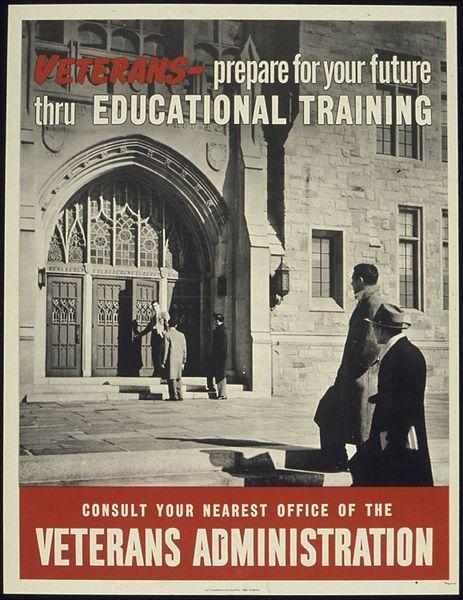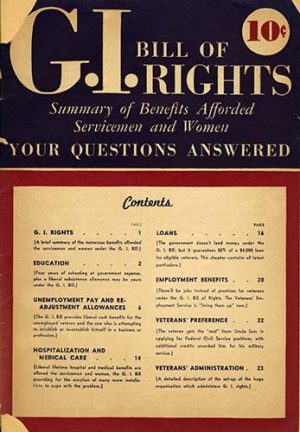State Representative Blaine Wilhour (R-Beecher City) is reminding communities and schools that since 2018, November 4 is on the list of observed days in Illinois history in recognition of the role played by eight veterans who met on that date in 1943. Those World War I veterans met at the Luther B. Easley American Legion Post 128 in Salem, Illinois after a Legion membership dinner to discuss what they thought should be done for the World War II veterans to readjust to civilian life after the war was over.
“The G.I. Bill was a huge legislative accomplishment that impacted our country and helped thousands of returning veterans to finish their education, purchase their first home, and start thousands of businesses across America,” said Rep. Blaine Wilhour, a veteran of the Illinois Army National Guard. “The support to our service members returning from that combat duty helped to spur the economic boom of the 1950’s in our country.”
The law signed in 2018 amended the State Commemorative Dates Act to include the 4th day of November of each year to be designated as ‘G.I. Bill of Rights Day’ in Illinois. Not designated as a day off from work or school, it is intended to be observed throughout the state as a day in recognition of the landmark legislation officially known as the Servicemen’s Readjustment Act that was born here.
At the November 4, 1943 meeting notes were taken down on napkins according to local history, and then they were taken by former Governor John Stelle to Washington, D.C., where he met with other Legion members from around the country to write the first draft of the legislation. On June 26, 1958, the American Legion – Department of Illinois recognized the Luther B. Easley Post 128 in Salem with a citation stating, “That All Men will now recognize the Luther B. Easley Post 128 as the Birthplace of the G.I. Bill of Rights.”
The eight Illinois American Legion members at that Salem meeting were Omar J. McMackin – Salem, Earl W. Merritt – Salem, former Governor John Stelle – McLeansboro, Dr. Leonard W. Esper – Springfield, George H. Bauer – Effingham, William R. McCauley – Olney, James P. Ringley – Lemont, and A. L. Starshak – Chicago.
Former Governor John Stelle was appointed by the American Legion to be the point man to shepherd this legislation through the U.S. Congress and was so instrumental in the passage that he was with President Franklin D. Roosevelt when he signed it into law on June 22, 1944. The law was officially titled the Servicemen’s Readjustment Act and was created to assist veterans of active service in the Armed Forces during World War II.
The bill that President Roosevelt initially proposed had a means test—only poor veterans would get one year of funding and only top-scorers on a written exam would get four years of paid college. The American Legion proposal provided full benefits for all veterans, including women and minorities, regardless of their wealth.
The G.I. Bill unanimously passed both chambers of congress in the spring of 1944. President Franklin D. Roosevelt signed it into law on June 22, 1944 – just days after the D-Day invasion of Normandy.
An important provision of the G.I. Bill was low interest, zero down payment home loans for servicemen, with more favorable terms for new construction compared to existing housing. This encouraged millions of American families to move out of urban apartments and into suburban homes.
Another provision known as the 52–20 clause for unemployment provided that unemployed war veterans would receive $20 once a week for 52 weeks for up to one year while they were looking for work. Less than 20 percent of the money set aside for the 52–20 Club was actually distributed. Rather, most returning service men quickly found jobs or pursued higher education.

The original G.I. Bill ended in 1956. A variety of benefits have been available to military veterans since the original bill, and these benefits packages are commonly referred to as updates to the G.I. Bill. A greater percentage of Vietnam veterans used G.I. Bill education benefits (72 percent)than World War II veterans (49 percent) or Korean War veterans (43 percent).
Gov. Bruce Rauner signed the Illinois legislation that makes Nov. 4 G.I. Bill of Rights Day in Illinois on Aug. 13, 2018. A signed copy of the legislation hangs in the American Legion Hall in Salem.
“I encourage teachers to include this G.I. Bill history in their lesson plans regarding World War II and wherever possible, schools and communities should help remember this date in Illinois history,” concluded Rep. Wilhour.
